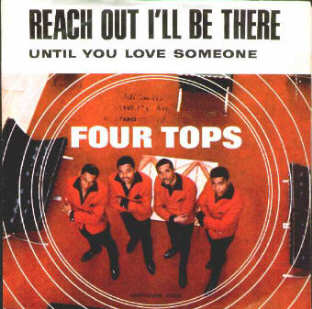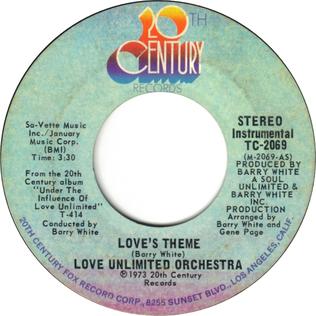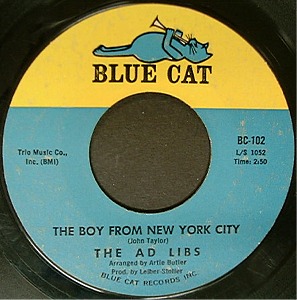Related Research Articles

"Stop! In the Name of Love" is a 1965 song recorded by the Supremes for the Motown label.

"Come See About Me" is a 1964 song recorded by the Supremes for the Motown label. The track opens with a fade-in, marking one of the first times the technique had been used on a studio recording.

"Back in My Arms Again" is a 1965 song recorded by The Supremes for the Motown label.

"My Girl" is a soul music song recorded by the Temptations for the Gordy (Motown) record label. Written and produced by the Miracles members Smokey Robinson and Ronald White, it became the Temptations' first U.S. number 1 single, and is currently their signature song. Robinson's inspiration for writing "My Girl" was his wife, Miracles member Claudette Rogers Robinson. The song was included on the Temptations 1965 album The Temptations Sing Smokey. In 2017, the song was selected for preservation in the National Recording Registry by the Library of Congress as being "culturally, historically, or artistically significant".

"Reach Out I'll Be There" (also formatted as "Reach Out (I'll Be There)") is a song recorded by the Four Tops from their fourth studio album Reach Out (1967). Written and produced by Motown's main production team, Holland–Dozier–Holland, the song is one of the most widely-known Motown hits of the 1960s and is today considered the Four Tops' signature song.

"Cara Mia" is a popular song published in 1954 that became a UK number 1, and US number 10 hit and Gold record for English singer David Whitfield in 1954, and a number 4 hit for the American rock group Jay and the Americans in 1965. The title means "my beloved" in Italian.

"The Tracks of My Tears" is a song written by Smokey Robinson, Pete Moore, and Marv Tarplin. It is a multiple award-winning 1965 hit R&B song originally recorded by their group, The Miracles, on Motown's Tamla label. The Miracles' million-selling original version has been inducted into The Grammy Hall of Fame, has been ranked by the Recording Industry Association of America and The National Endowment for the Arts at No. 127 in its list of the "Songs of the Century" – the 365 Greatest Songs of the 20th Century, and has been selected by Rolling Stone as No. 50 on its list of "The 500 Greatest Songs of All Time", among many other awards. In 2021, Rolling Stone ranked The Miracles' original recording of "The Tracks of My Tears" as "The Greatest Motown Song of All Time."

"Let's Hear It for the Boy" is a song by Deniece Williams that appeared on the soundtrack to the feature film Footloose. The song was released as a single from both the soundtrack and her album of the song's same name on February 14, 1984, by Columbia Records. It was written by Tom Snow and Dean Pitchford and produced by George Duke. The song became Williams' second number one on the US Billboard Hot 100 on May 26, 1984, also topping the dance and R&B charts, and peaked at number two on the UK Singles Chart, behind "Wake Me Up Before You Go-Go" by Wham!. It was nominated for an Academy Award for Best Original Song, and was certified platinum in the US and gold in Canada and the UK by the Recording Industry Association of America, Music Canada and the British Phonographic Industry, respectively. The music video was released in mid-April 1984. The song features background vocals from George Merrill and Shannon Rubicam, who would go on to form the duo Boy Meets Girl.

"Get Together", also known as "Let's Get Together" and "Everybody Get Together", is a song by American rock band the Youngbloods, originally included in their 1967 debut album The Youngbloods. It was written in the mid-1960s by American singer-songwriter Chet Powers, from psychedelic rock band Quicksilver Messenger Service. The single was The Youngbloods' only Top 40 on Billboard Hot 100—peaking at No. 5 in 1969.

"My World Is Empty Without You" is a 1965 song recorded and released as a single by the Supremes for the Motown label.

"Love's Theme" is an instrumental piece written by Barry White around 1965. Recorded and released as a single by White's Love Unlimited Orchestra in 1973, it was one of the few instrumental and purely orchestral singles to reach #1 on the Billboard Hot 100 chart in the United States, which it did in early 1974. Billboard ranked it as the #3 song for 1974.

"This Magic Moment" is a song composed by lyricist Doc Pomus and pianist Mort Shuman. It was first recorded by The Drifters, with Ben E. King singing lead.

"The Boy from New York City" is a song originally recorded by the American soul group The Ad Libs, released in 1964 as their first single. Produced by Jerry Leiber and Mike Stoller, the song peaked at No. 8 on the US Billboard Hot 100 on the chart week of February 27, 1965. Though the group continued to record other singles, they never repeated the chart success of "The Boy from New York City". According to Artie Butler, the track was recorded at A&R Studios in New York, in three separate sessions. The first session was to lay down the rhythm section, then the next session was for the lead and backup vocals, with the last session was just for the horns.

"Nothing but Heartaches" is a 1965 song recorded by The Supremes for the Motown label.

Paul Revere & the Raiders are an American rock band from Boise, Idaho. Formed in 1958, the band released their first hit single three years later, "Like, Long Hair", which reached number 38 on the U.S. Billboard Hot 100 chart. Following a few minor charting singles, including a version of "Louie Louie", the band worked with producer Terry Melcher in updating their sound, combining fast-paced, guitar-and-vocal-dominated rock and roll with an intimidating R&B flavor. The result was a string of commercially successful singles, beginning with 1965's "Steppin' Out" and continuing with "Just Like Me", which reached number 11 on the Hot 100, as well as "Kicks", "Hungry", and "Good Thing", all of which peaked inside the top 10. In addition, the band's three 1966 studio albums—Just Like Us!, Midnight Ride, and The Spirit of '67—were each certified gold in the United States.

"Desirée" is a 1977 song written and recorded by Neil Diamond and included as a track on Diamond's 1977 album, I'm Glad You're Here with Me Tonight. The single peaked at number 16 on the Billboard Hot 100 and reached number one on the U.S. Easy Listening chart to become his fifth number one on that chart. The song likewise reached number one on the Canadian AC chart.

"How Sweet It Is (To Be Loved by You)" is a song recorded by American soul singer Marvin Gaye from his fifth studio album of the same name (1965). It was written in 1964 by the Motown songwriting team of Holland–Dozier–Holland, and produced by Brian Holland and Lamont Dozier. The song title was inspired by one of the actor and comedian Jackie Gleason's signature phrases, "How Sweet It Is!"
"Long Lonely Nights" is a song that was originally released by Lee Andrews & the Hearts in 1957. Hit versions were also released by Clyde McPhatter, later in 1957, and Bobby Vinton in 1965. The song was written by Lee Andrews, though Larry Brown, Doug Henderson, and Mimi Uniman were given songwriter credit as well, in a practice that was common at the time.
"He Understands Me" is a song released in 1963 by Teresa Brewer. The song was a hit single for Johnny Tillotson in 1964, retitled "She Understands Me", and Bobby Vinton in 1966, retitled "Dum-De-Da".

"Do I Love You?" is a song written by Phil Spector, Pete Andreoli and Vini Poncia. It was recorded by American girl group the Ronettes in 1964 and released on their debut album Presenting the Fabulous Ronettes.
References
- ↑ https://secondhandsongs.com/performance/877027/all
- ↑ Jay and the American's charting singles Retrieved December 6, 2011
- ↑ "Top RPM Singles: Issue 5606." RPM . Library and Archives Canada.
- ↑ "Song artist 756 - Jay & the Americans". Tsort.
- ↑ "CASH BOX Top 100 Singles". CashBox. February 13, 1965.